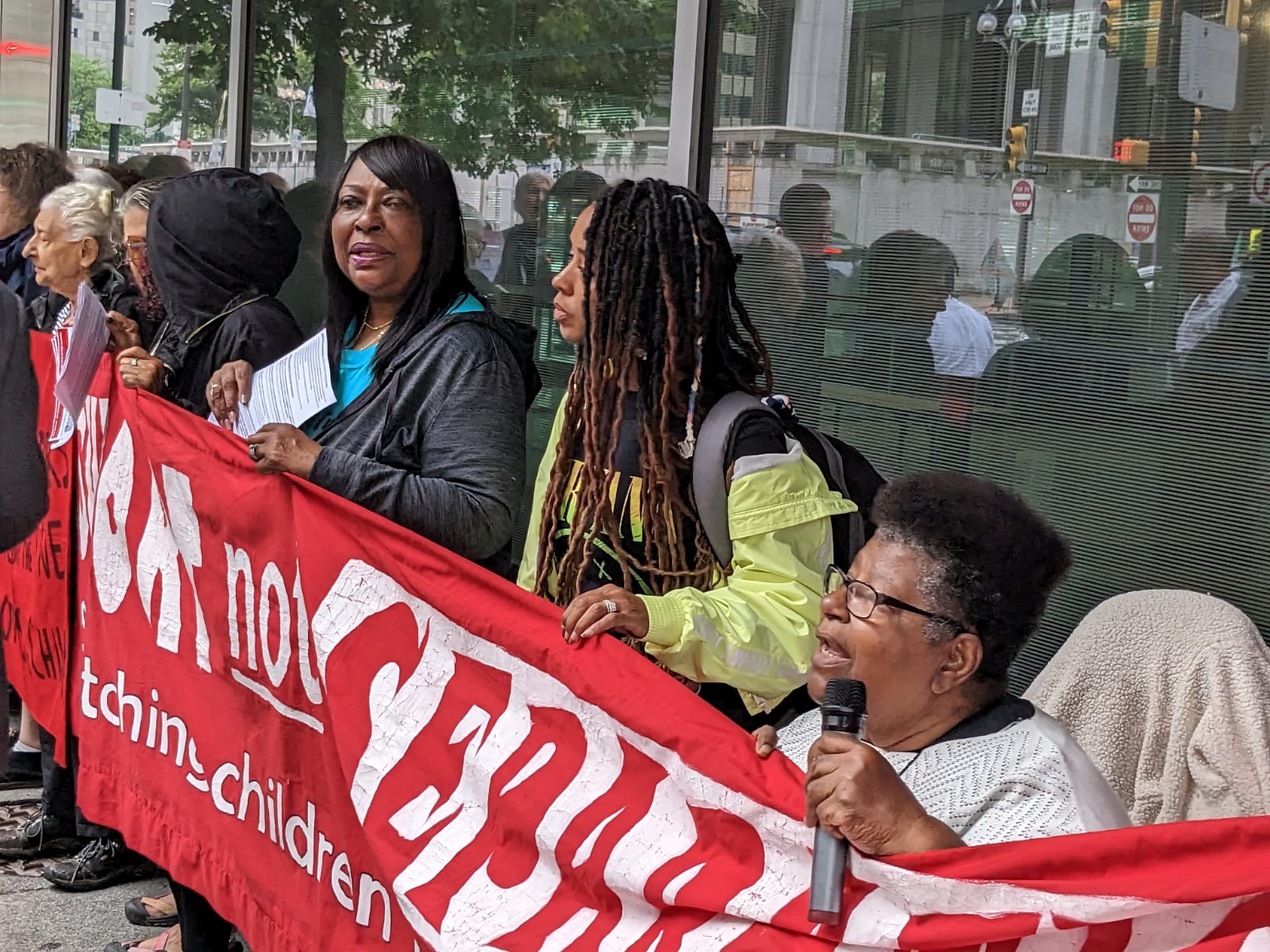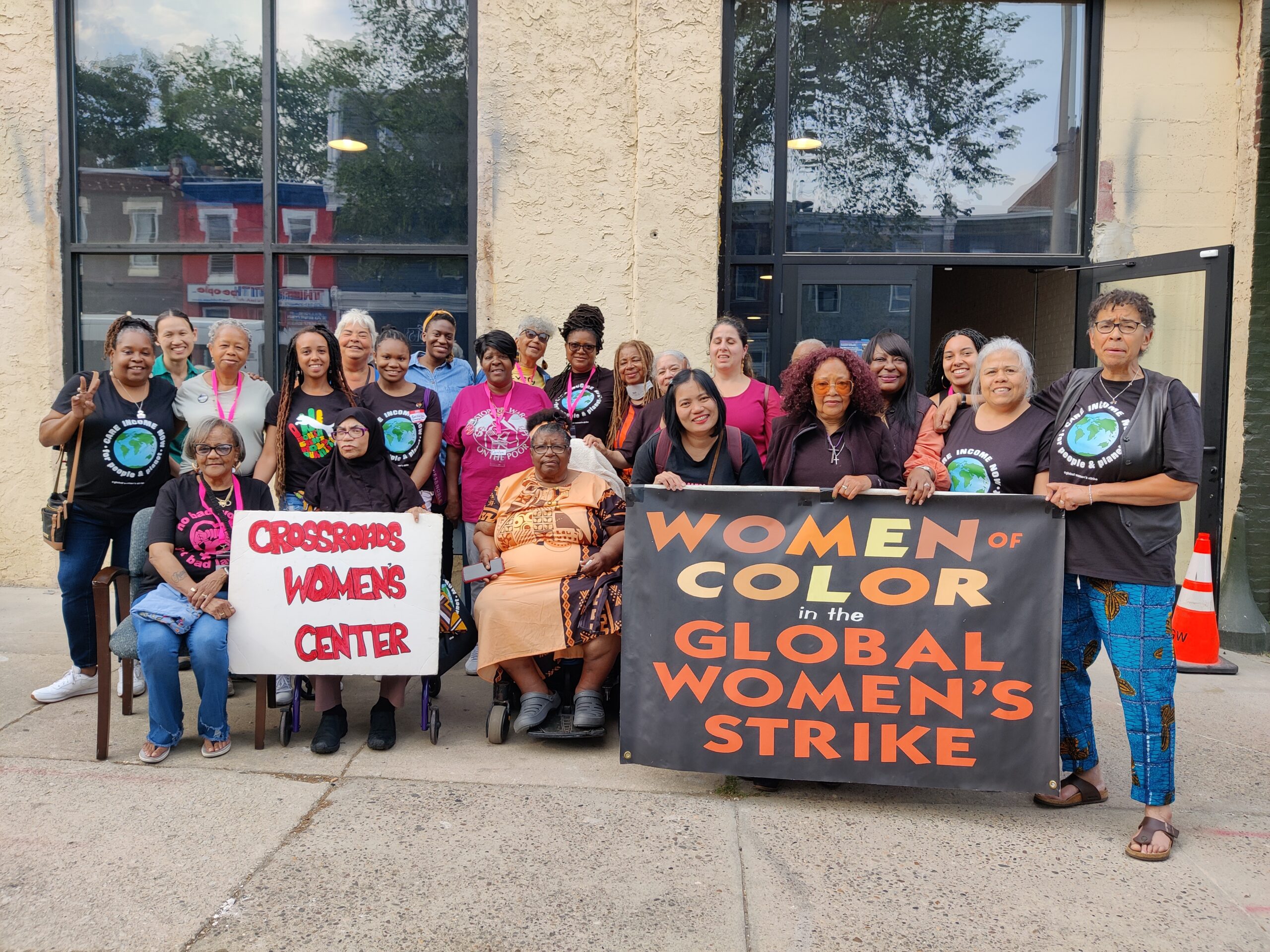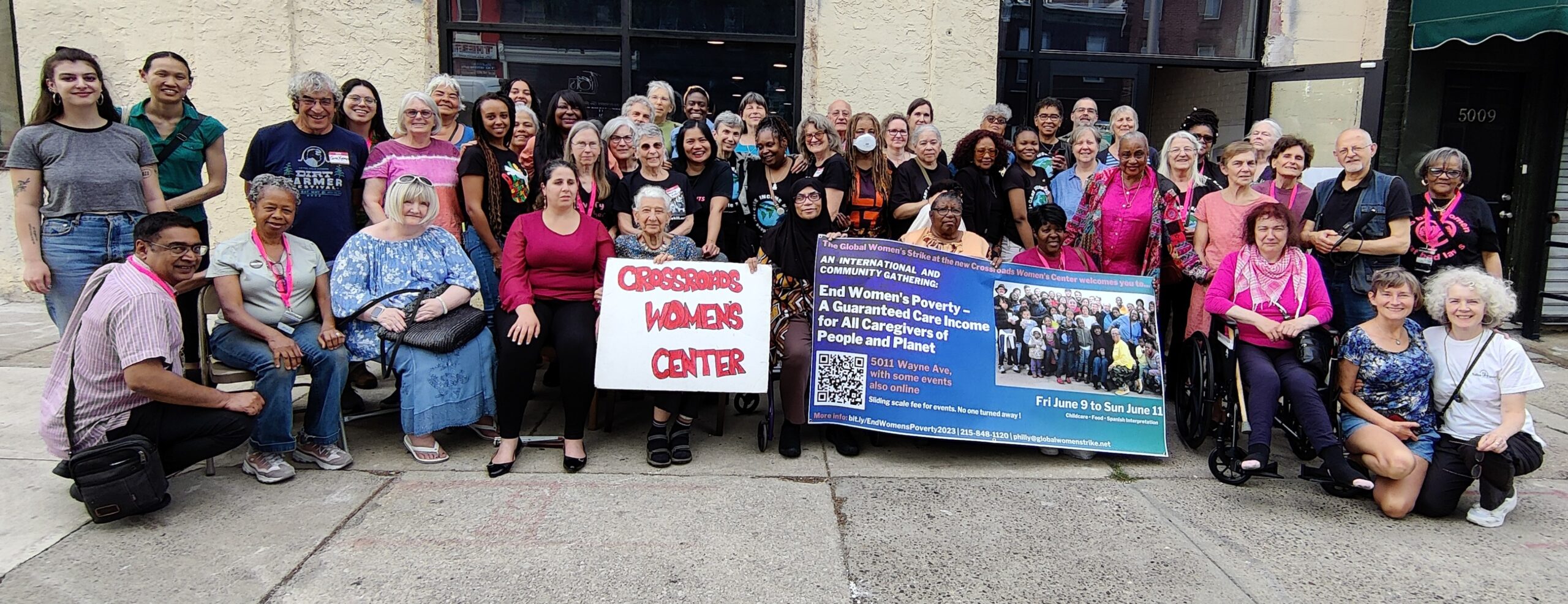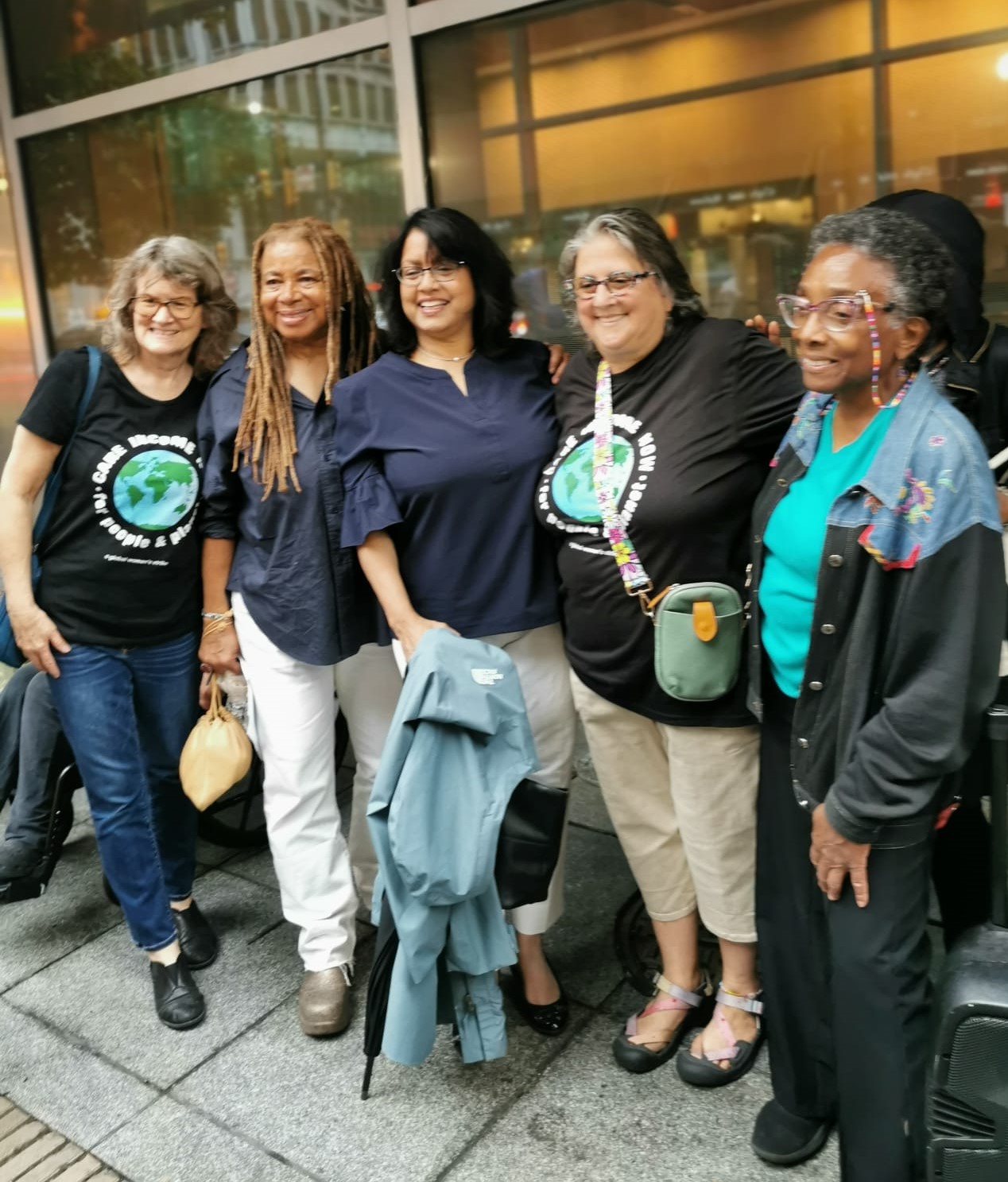Our new Crossroads Women’s Center in Philadelphia is well and truly launched! On June 9-11, 2023, the Global Women’s Strike held an international and community gathering there, putting our multiracial Center on the map, strengthening the connections between struggles, and making new ones.
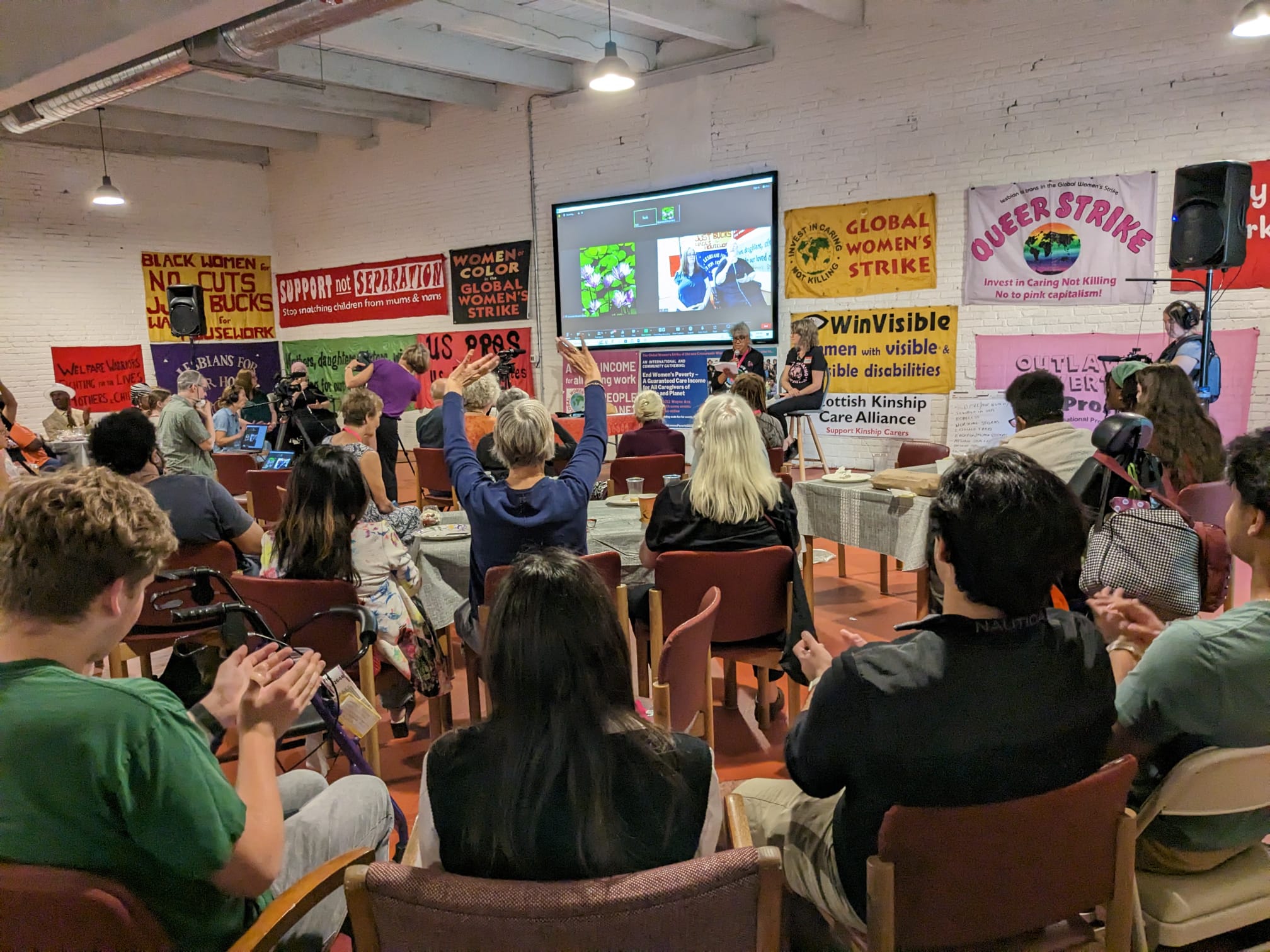
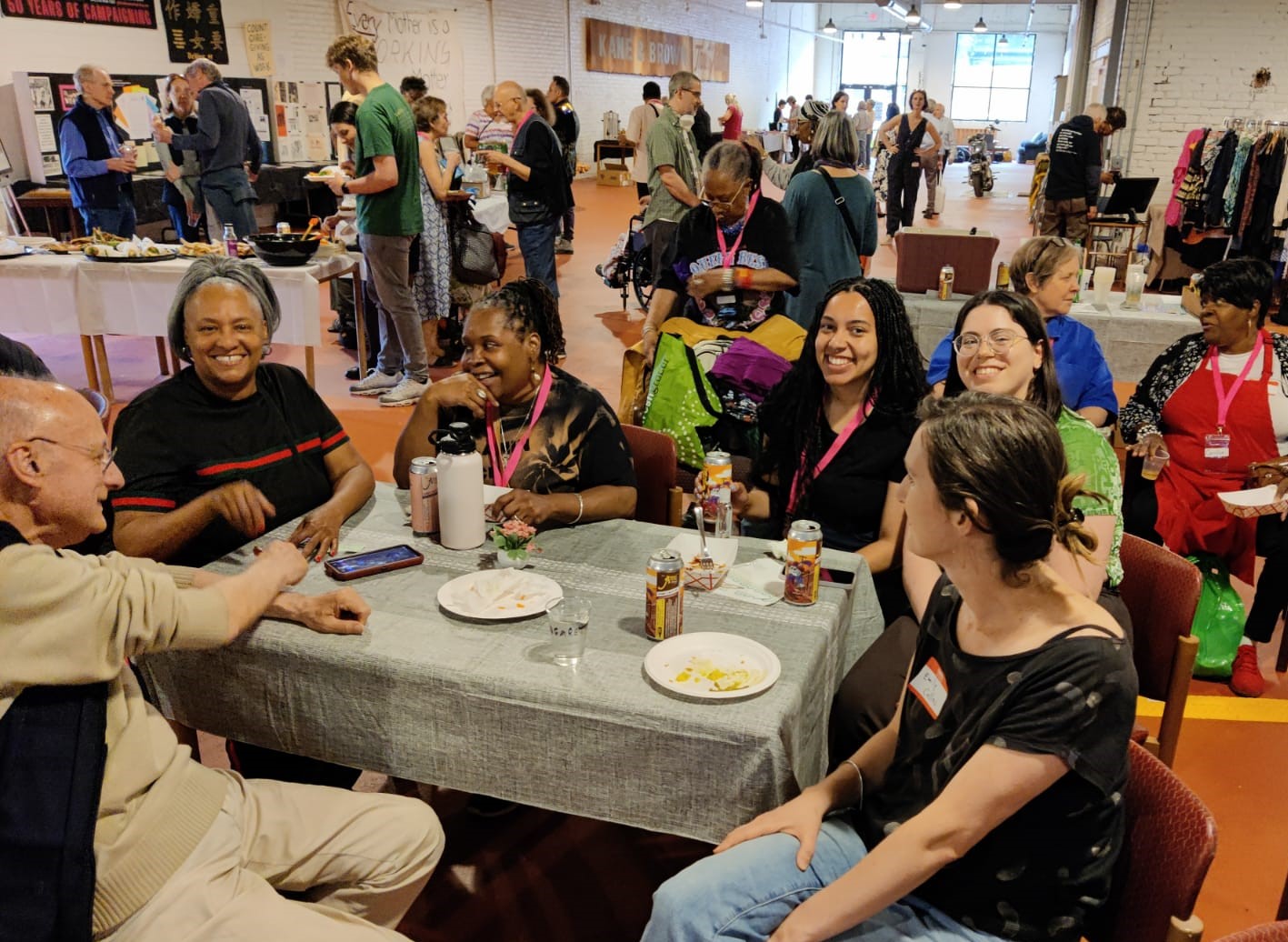
>>> It started with a reception and Wages for Housework archives highlighting over 50 years of campaigning, attended by neighbors, friends and family, students and supporters, and some public officials. Here are some highlights of this exciting event which, after two years of covid, brought together our network and others. We hope you will take part in our follow up initiatives.
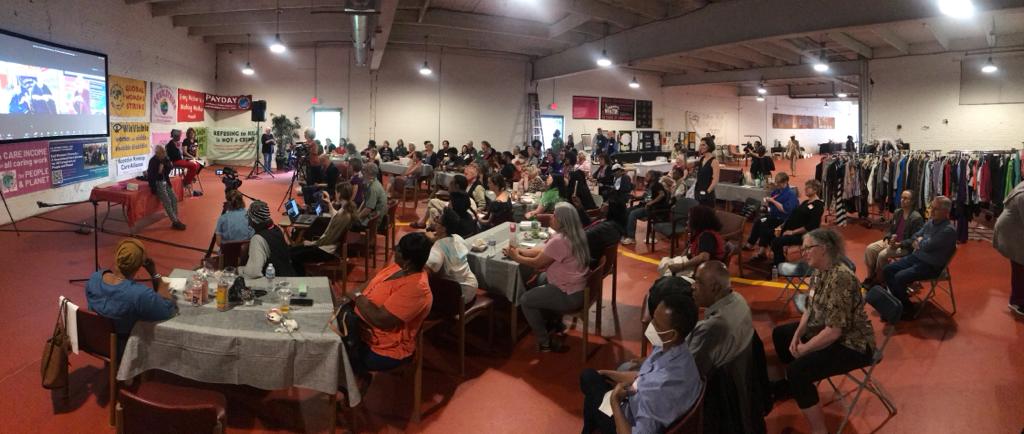
1. Ending women’s poverty – the central issue
Women make all the people of the world, but this reproductive and caring work without which there is no society brings no financial reward. Because we begin with people, not with capitalist production and profits, we are reduced, impoverished and exploited.
Our first session focused on the movement to stop our children being taken by the state child removal industry. They deny the bond between mother and child, discriminate against kinship carers, and profit financially from the harm and trauma they inflict by separating our children from us, especially if we are Black, Indigenous, of color, immigrant, and/or single mother families. We are winning cases, stopping forced adoptions and reuniting families, including those torn apart by the immigration authorities. We are also winning legislation (Kamlager Bill) and recommendations (Philadelphia Special Committee on Child Separations) that ‘poverty is not neglect’ and therefore not a reason to take our children.
The session, like all the others, was followed by a workshop.
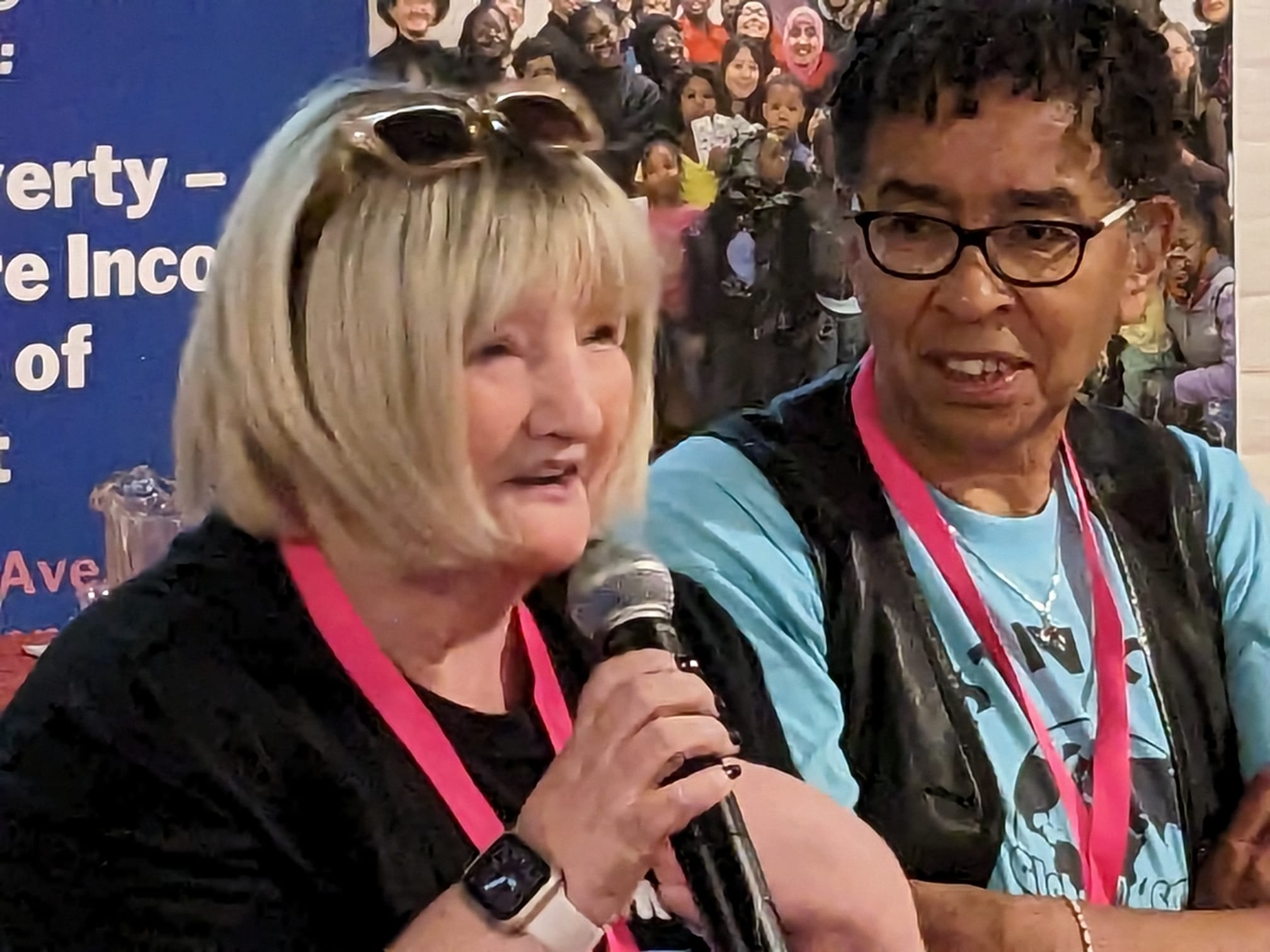
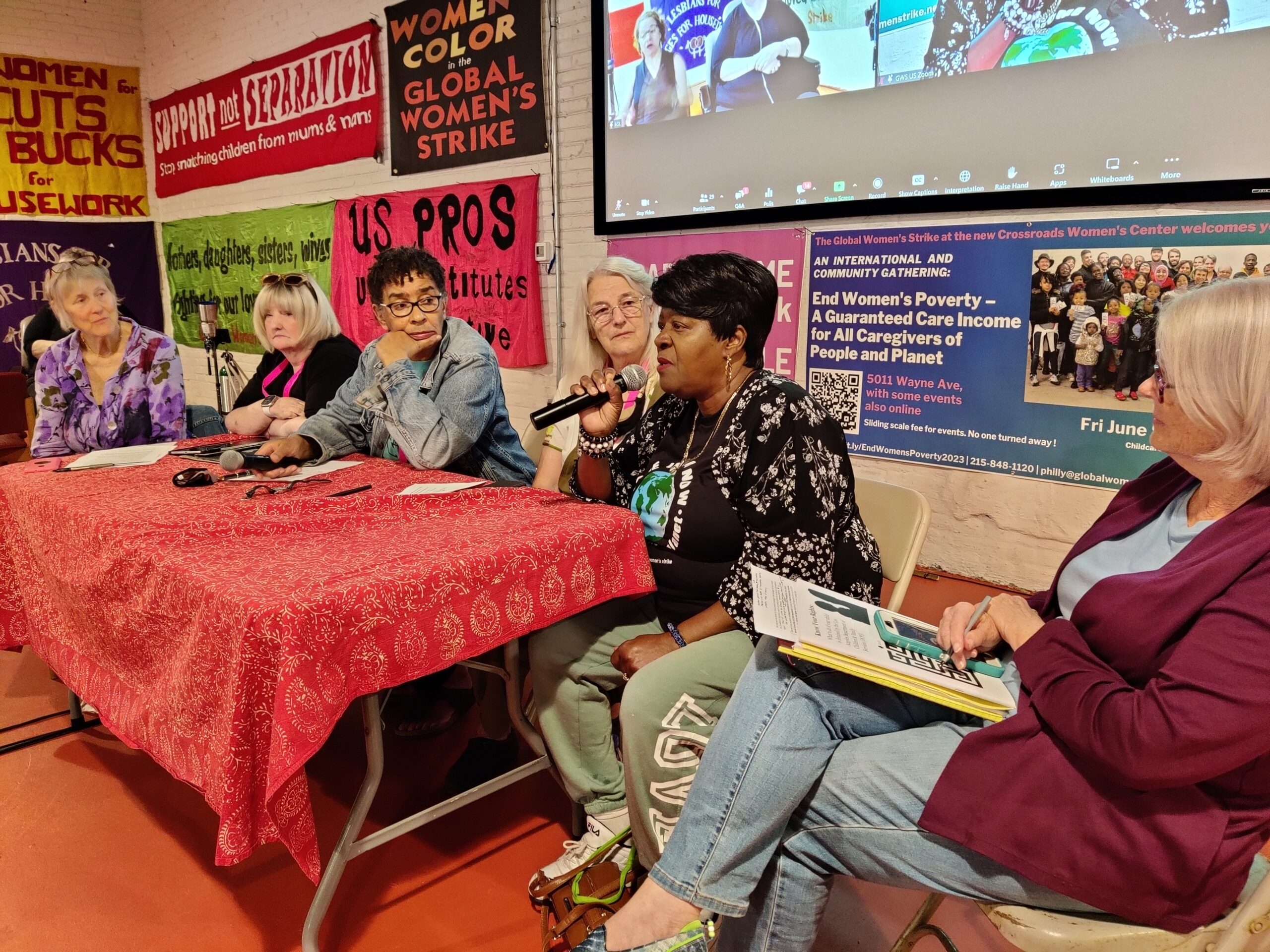
Panel speakers for this session:
Andrea James, Natl. Council for Incarcerated & Formerly Incarcerated Women & Girls (Boston) (online); Anne Neale, Support Not Separation (UK); Carolyn Hill, Give Us Back Our Children (GUBOC) (Phila); Jordan Harmon, Indigenous Environmental Network (Muscogee/Creek Nation) (online); Maru Mora Villalpando, La Resistencia (US) (online); Micheleine Kane, Scottish Kinship Care Alliance (Scotland); Sidney Ross-Risden, GUBOC (Los Angeles); Suranya Aiyar, mother & lawyer (India) could not attend, but the film Mrs Chatterjee vs Norway in which she is portrayed is available on Netflix.
2. The struggle for justice – a necessary part of caring work
From Haiti to Malaysia, the UK and US, women and communities are organizing to end the criminalization of poverty and defend loves ones: formerly incarcerated persons, mothers whose children are or have been in prison, sex workers supporting families, survivors of rape and domestic violence, and opposition to racism, Israeli apartheid, the death penalty … We have much in common and are strengthened in our determination to win the resources we are entitled to and stop the criminalization of our movements. We exchanged precious information about the struggles we are making and what we are achieving.
We were particularly honored to have with us via Zoom, Mildred Trouillot Aristide, former first lady of Haiti, who spoke about the extraordinary work of UNIFA (Université de la Fondation Dr Aristide) in the context of Haiti’s history of revolution against slavery, imperialism, repression and occupation.
President Aristide rightfully said that the option to live in Haiti and contribute to the education of our youth is a noble and heroic choice...The UNIFA teaching hospital is an affirmation of hope; an example of what is possible even under the most difficult circumstances.
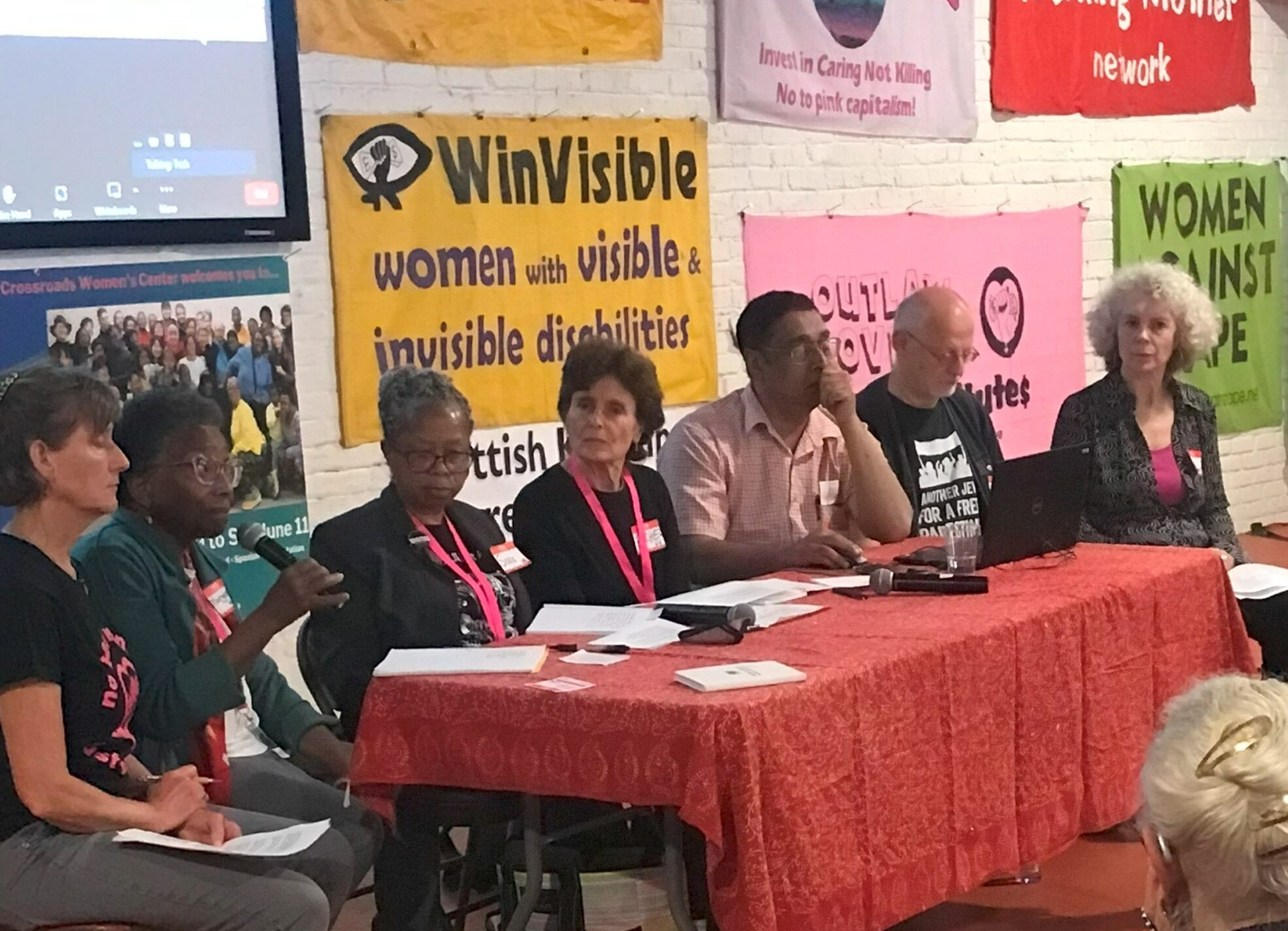
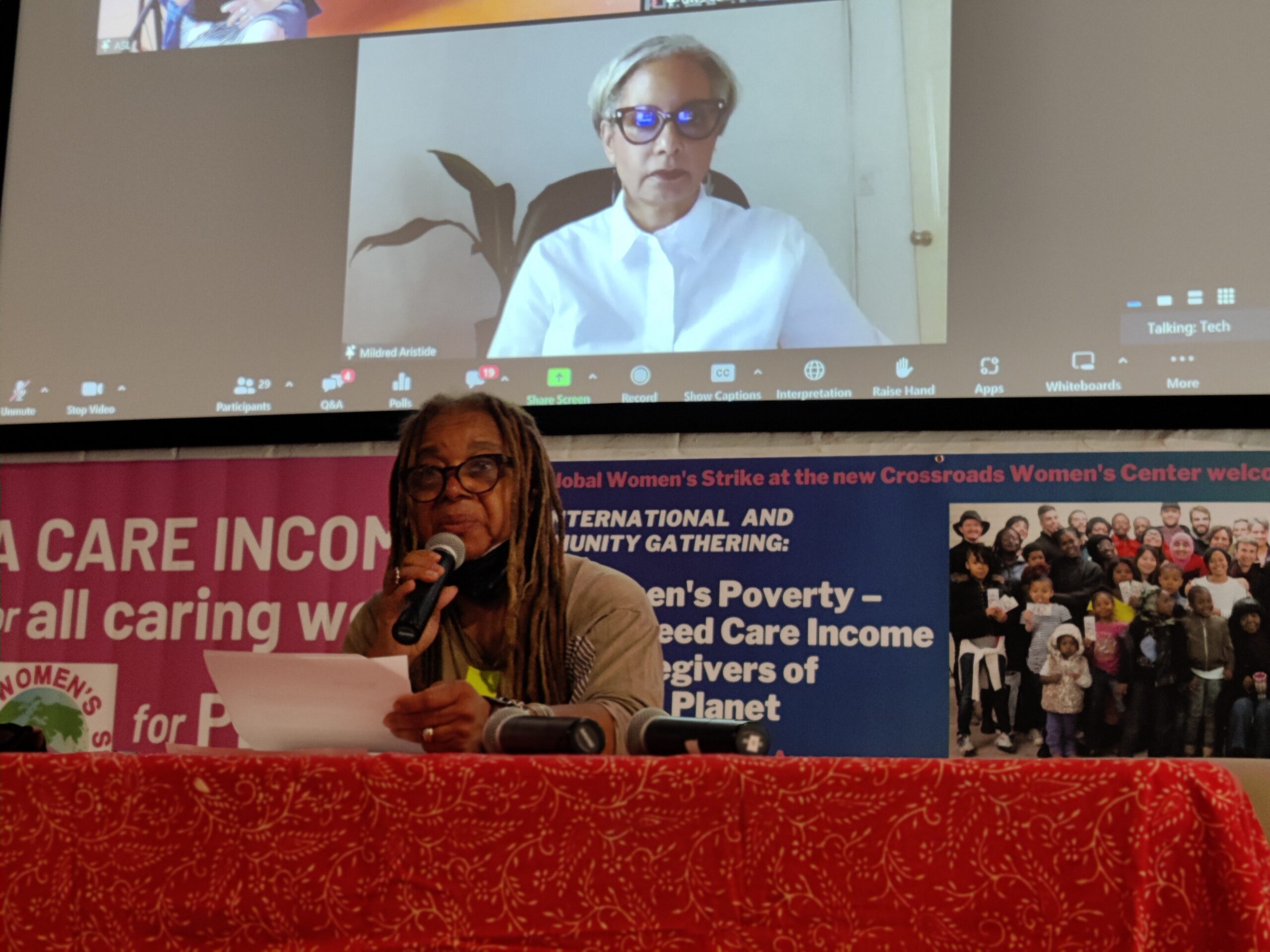
Keynote speaker: Mildred Trouillot-Aristide, former First Lady of Haiti (online).
Charles Hector, human rights lawyer (Malaysia); Lisa Longstaff, Women Against Rape (UK); Margaret Robertson, Germantown Participatory Defense Hub (Phila); Michael Kalmanovitz, Intl. Jewish Anti-Zionist Network (UK); Niki Adams, English Collective of Prostitutes (UK), Susan Burton, founder, A New Way of Life (Los Angeles) (online)
3. Regenerating the soil and the climate – women natural farmers
The climate emergency has made clear that caring for our planet is central to our survival. Didi Pershouse (US) demonstrated in our center’s wild garden how agroecology can regenerate the soil, which can have a dramatic effect on the climate. Vijay Kumar and Swati Renduchintala (India) described how a mass movement of women in Andhra Pradesh (AP), organized in self-help groups with the support of the AP government, is transforming communities and spearheading a natural farming revolution – increasing yields, protecting the natural world, improving health, and raising women’s incomes and power, including against domestic violence. This community managed natural farming is crucial to tackling climate change and must be scaled up. As Kumar explained:
Once we follow nature’s principles, the results will surprise us…One acre of land is becoming equal to three or four acres…90% of women in rural areas, close to two million women, are organized in self-help groups and their federations.
And Renduchintala stressed:
The key ingredient in addressing poverty is women coming together, harnessing their collective power.
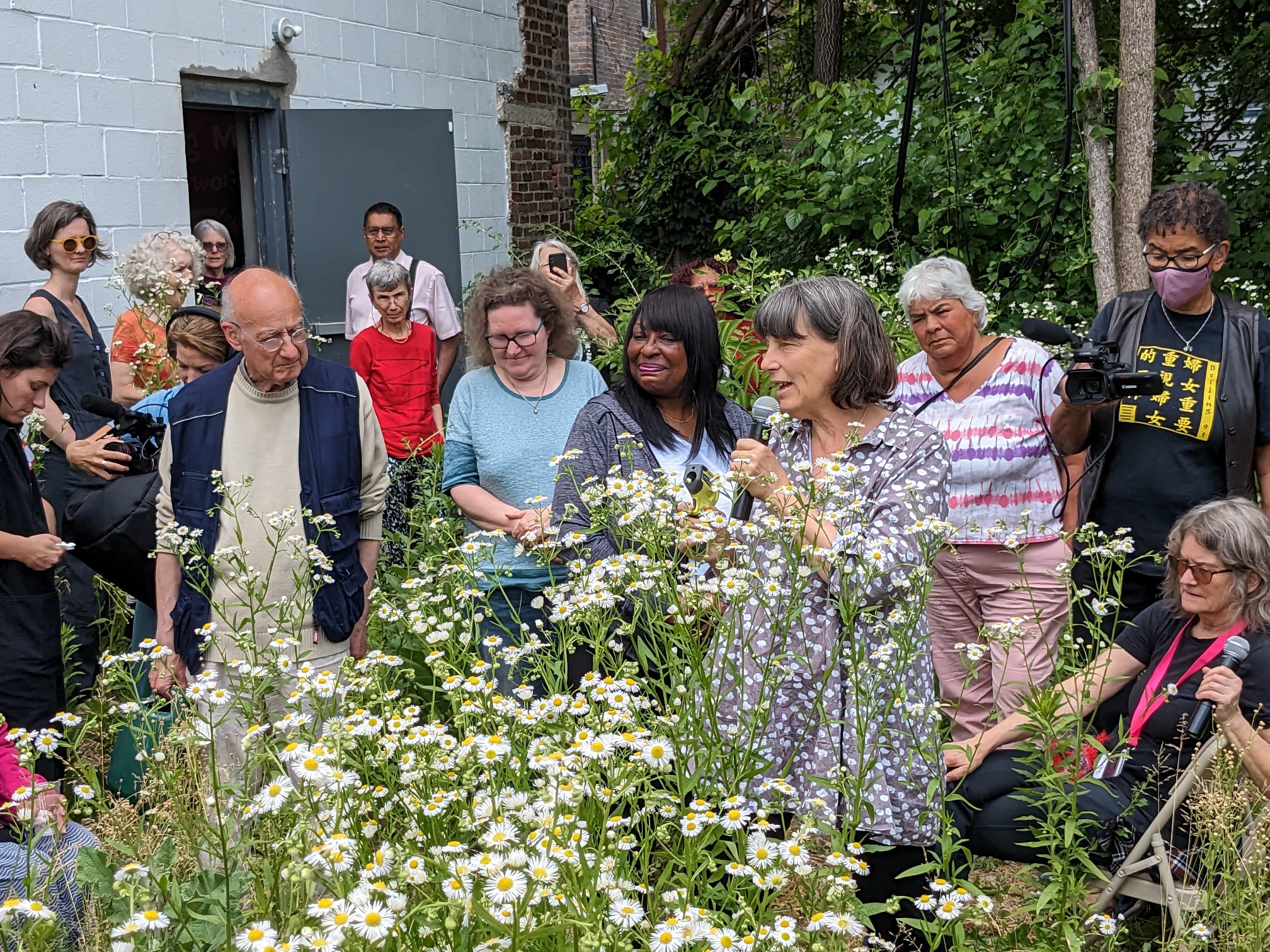
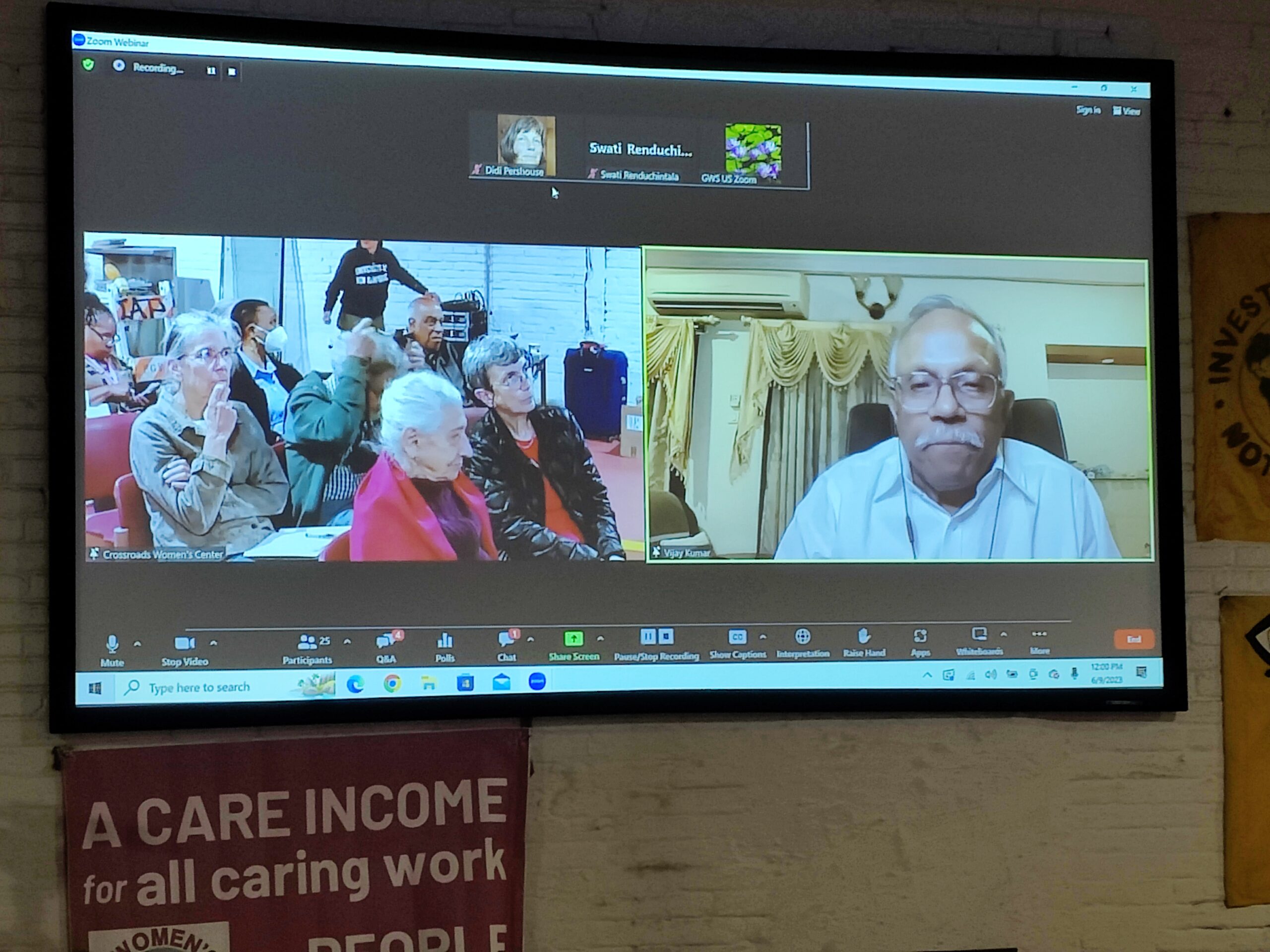
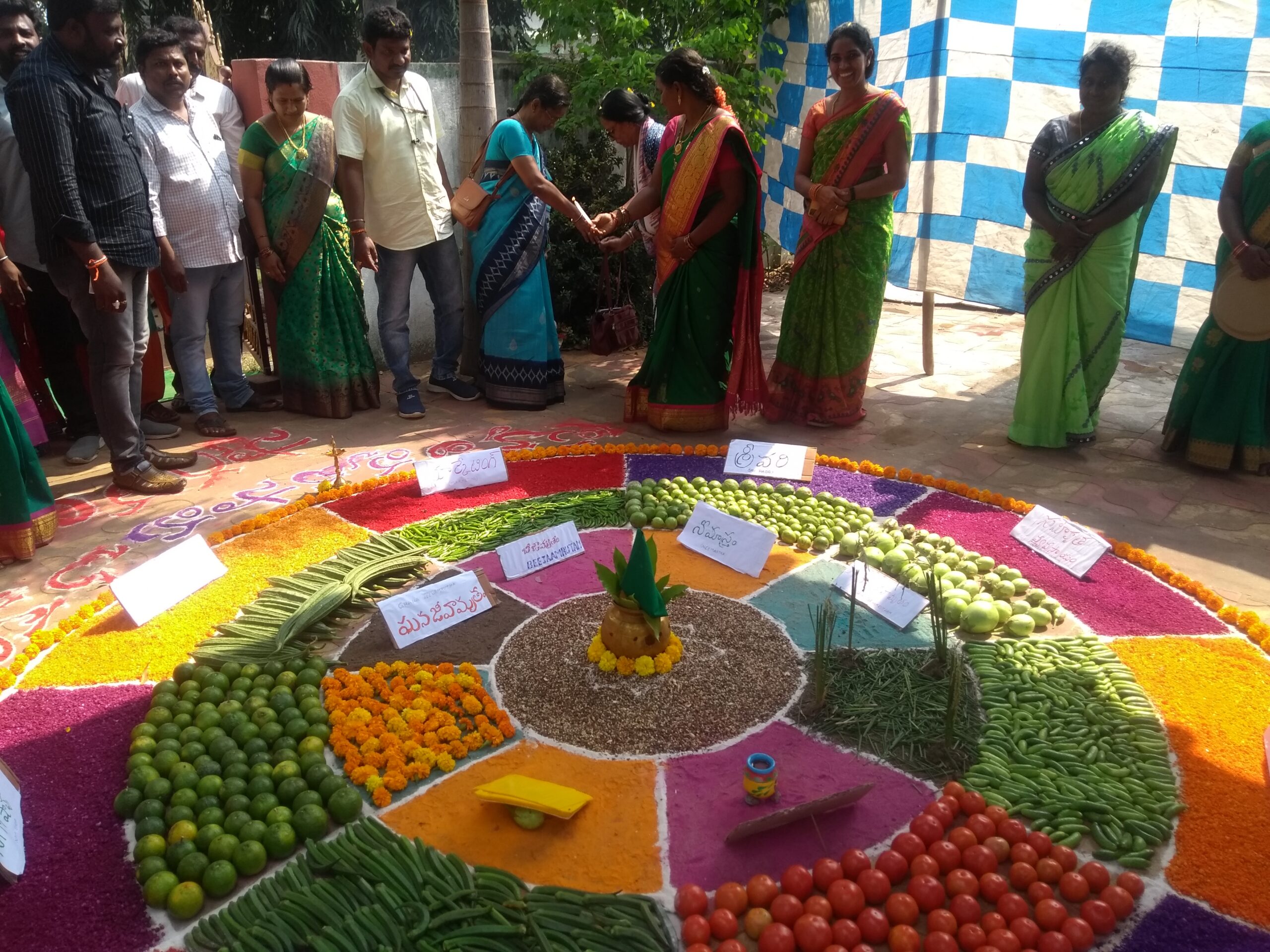
Panel speakers:
Didi Pershouse, educator, author and soil sponge strategist committed to building healthy communities both above and below ground. And Vijay Kumar, key advisor to Govt of Andhra Pradesh for Agriculture & Cooperation and Co-Vice Chairman, Rythu Sadhikara Samstha (India) (online).
4. Autonomy – central to organising together
The fundamental principle of sectors of the grassroots organizing autonomously while being accountable to each other, was described by Selma James to the delight of participants old and new. She told how the autonomous organizations in the Wages for Housework Campaign (WFH) she launched in 1972, had developed and shaped everything the Global Women’s Strike (GWS) does.
Autonomy is a way of organizing…We are respectful of each other, we consult each other, we support each other…We have agreed that all of us are exploited and that we need each other to end it. Each organization concentrates on different aspects of our exploitation, but we do not compete on who’s the most exploited.
Margaret Prescod went on to relate the history of the welfare rights movement, led by Black single mothers, a foundation of Women of Color in GWS.
It was those welfare mothers who were in the community and who on a day-to-day level kept the struggle going…and you don’t hear a lot about them. And that gave me a real education…It became very clear where the leadership was coming from.
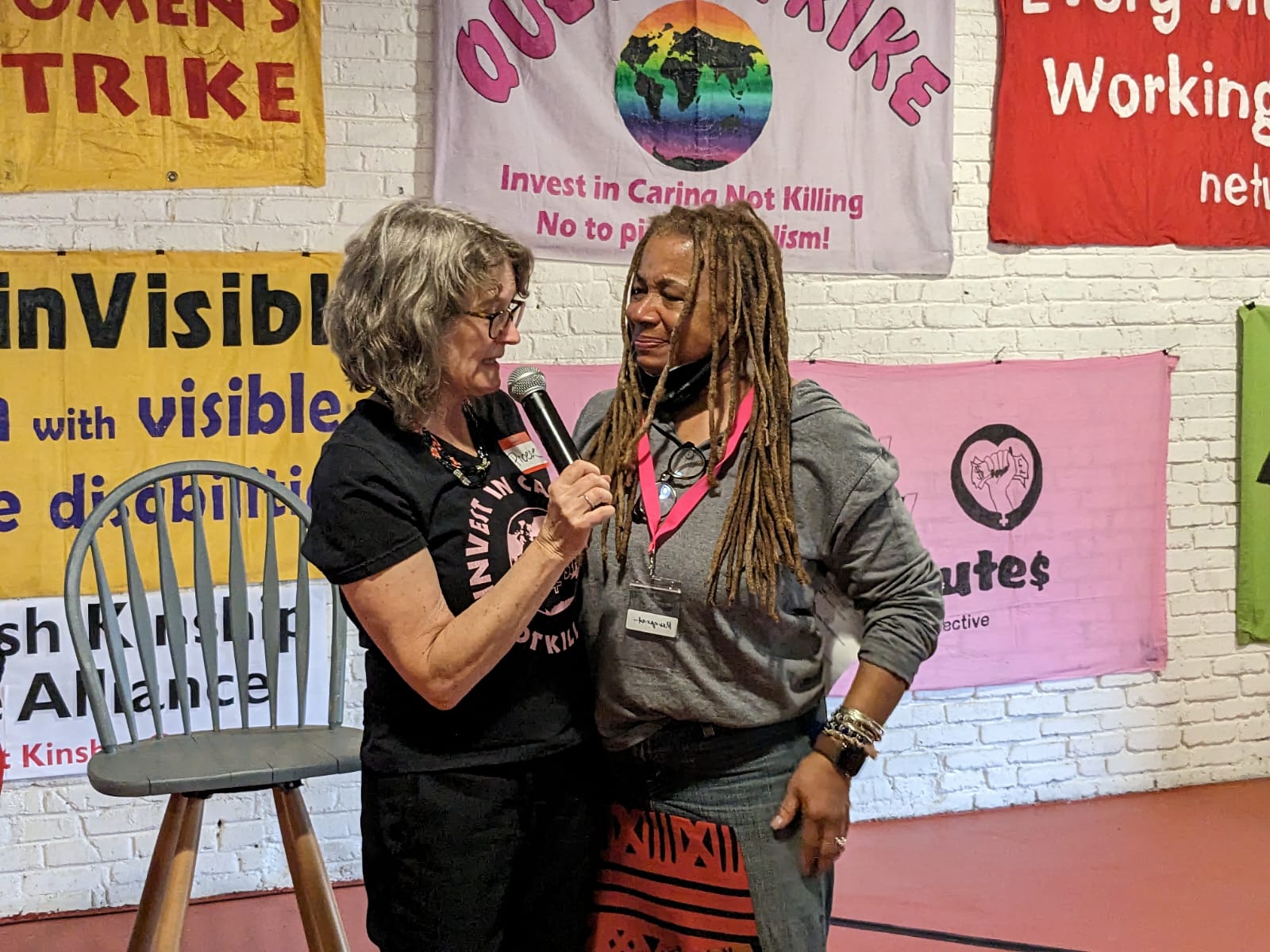
Panel speakers:
Selma James, Intl. Wages for Housework Campaign & Global Women’s Strike (GWS); And Swati Renduchintala, Andhra Pradesh Community Managed Natural Farming Program (India) (online). Margaret Prescod, Black Women for Wages for Housework & Women of Color/GWS.
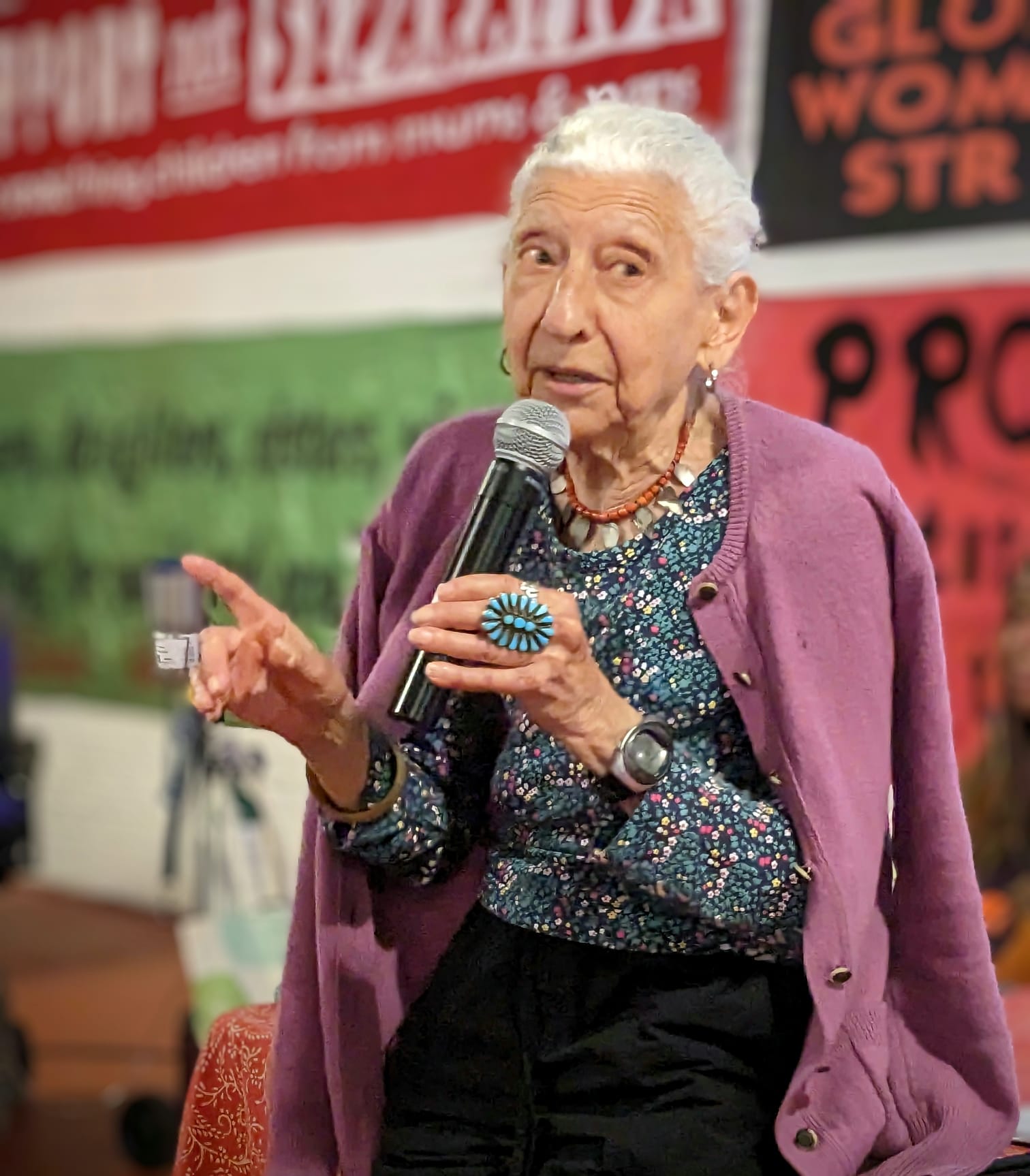
5. A guaranteed care income – follow up campaigning
The final panel detailed what we are winning and began to discuss how we can build on this now that we met in person, many of us for the first time. The scope was wide: from the first Poor People’s Campaign launched by Martin Luther King in 1968, which speaker Rev Annie Chambers was part of, to domestic workers winning protective legislation in Peru, pay equity in a US gas company, women with disabilities demanding both a care income and services, and the Community Women Human Rights Collective in Thailand which brings together 19 sectors of struggle, and works with the movement to defeat the military coup in Burma/Myanmar. We heard how the guaranteed income projects aimed at mothers as primary caregivers are sprouting all over the US and beyond. US Congresswoman Gwen Moore sent a rousing video message, explaining how her Worker Relief and Credit Reform Act which redefines work to include family caregivers and students, can provide a care income.
I’m speaking today to cheer on this fight to end women’s poverty and secure a guaranteed care income. Let us unite, amplify our voices and push for legislative change that recognises and values the immense contribution of caregivers.
We gave tribute to the WFH campaigners who are no longer with us but who contributed so much to where we are today: Andaiye, Nancy Carroll, Carole Hardie, Liz Hilton, Bernadette Maharaj, Lori Nairne, Maria Reyes, Ruth Todasco, Clotil Walcott, Betty Ann Workman. Presente!
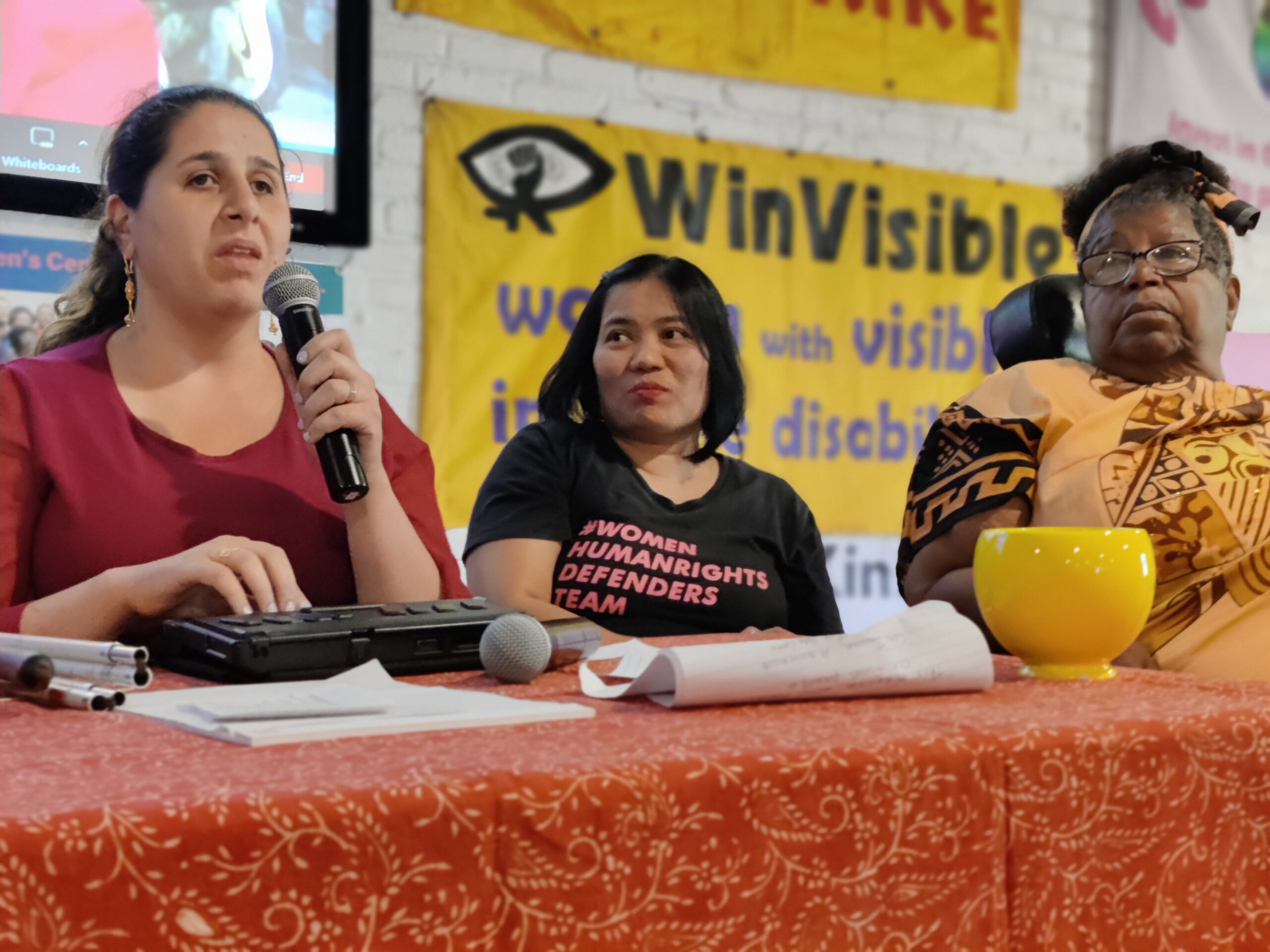
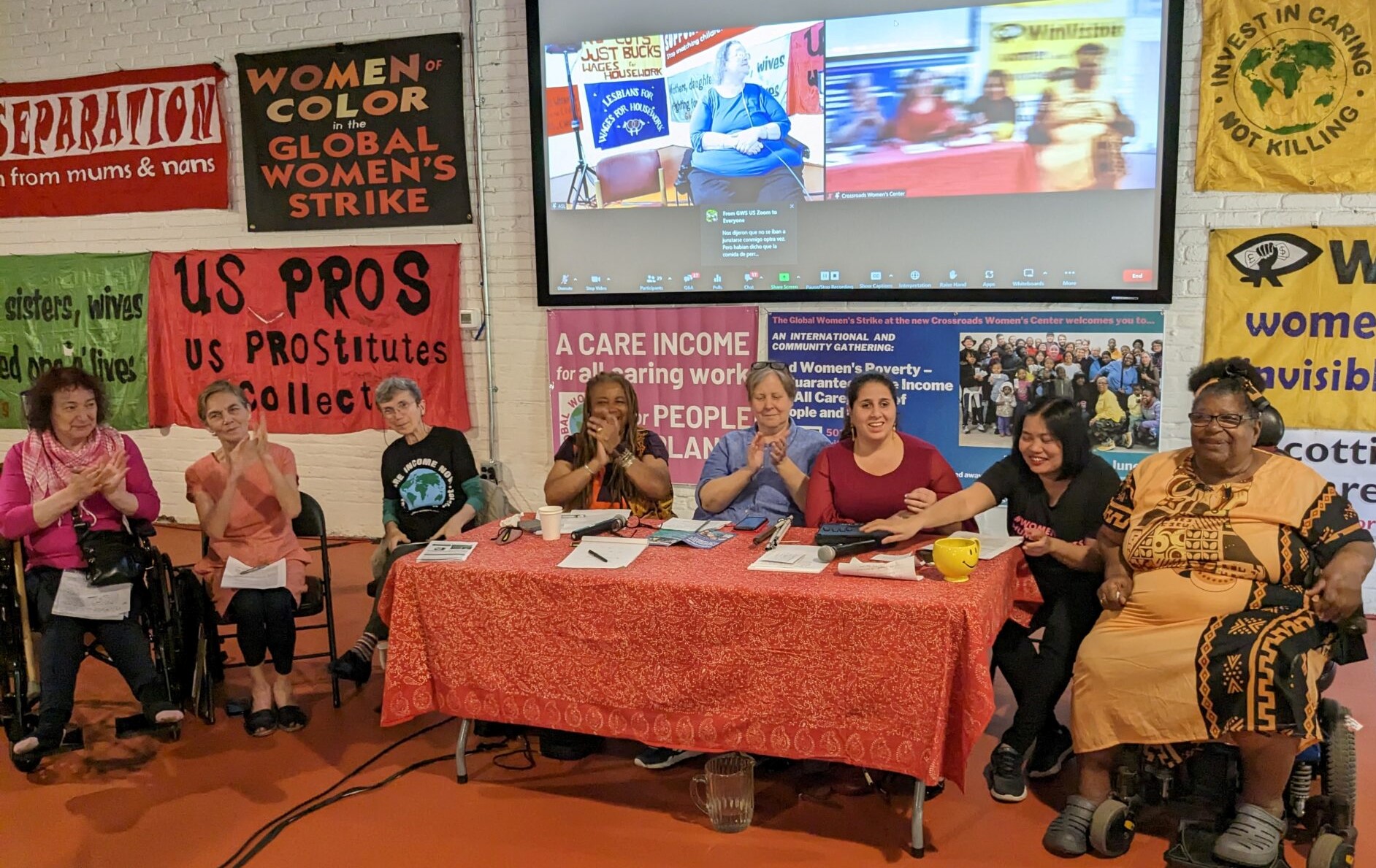
Panel speakers for this session:
Rev. Annie Chambers, Natl. Welfare Rights Union and original Poor People’s Campaign (US); Claire Glasman, WinVisible (women with visible and invisible disabilities, UK); Congresswoman Gwen Moore who introduced the Worker Relief and Credit Reform Act (WI) (video presentation); Leddy Mozombite Linares, Domestic Workers Federation FENTTRAHOP (Peru) (online); Nina López, Global Women’s Strike (UK); Peggy O’Mara, former editor, Mothering Magazine (Colorado) (online); Pranom Somwong, Protection International (Thailand); Shafeka Hashash,Guaranteed Income at Economic Security Project (US); Solveig Francis, Crossroads Women (London, England)
6. What next ?
The gathering was followed on June 12, by a demonstration outside Philadelphia’s family court demanding implementation of the City Council Special Committee recommendations on child separations. A Pride month event on June 13, at the Central Library, Coming Out in Millions with Wages for Housework, ended the formal activities. Many informal meetings and socializing, including a “field” trip to the regenerative farm of Payday member Dean Kendall, were key to getting to know each other and building the movement to end women’s poverty.
We are now focusing on making Gwen Moore’s bill widely known and supported, and expanding pilot projects for a care income.
In October, we will be launching the figures and analysis of our survey, What Mothers and Other Caregivers Want, which had input from over 50 countries. Preliminary findings were reported at the gathering.
The groups campaigning against child separations are working together more closely across states and national boundaries, expanding the monthly pickets of the family court in London to Philadelphia and hopefully also Scotland.
Ireland will hold a referendum on changing its constitution to expand the financial recognition of caregivers in the home and outside. Thailand has voted for a popular government committed to reworking the constitution; the women’s collective is campaigning for it to include a care income and for the decriminalization of sex work to be implemented, but it is unclear whether the military which called the election will carry out the people’s will. Pranom Somwong explained:
This is not just an election, it’s more than 10 years of organizing among different sectors. And the people who are leading that struggle are the mothers and the carers and the young activists. If the new dawn is coming, it’s coming from us – all of us here and everyone of us back home.
On 19 July, Andhra Pradesh launched the first independent evaluation of their program, “Natural Farming Through a Wide-Angle Lens: True Cost Accounting Study of Community Managed Natural Farming in Andhra Pradesh, India.” Unlike market-based research, this counts the benefits to people and nature.
The antipoverty, antideportation, antirape, anti-criminalization work continues, much invigorated. And the Crossroads Women’s Centre in Philadelphia is now a community and international resource – watch this space!
We hope you will dig into the recordings of the sessions and get back to us with your observations and concerns. All the sessions had sign language interpretation and there was some Spanish translation.
We look forward to working with you in a collective self-help way.
